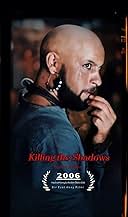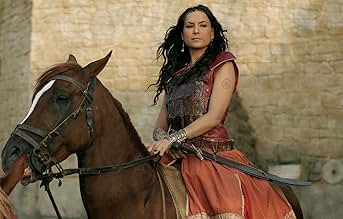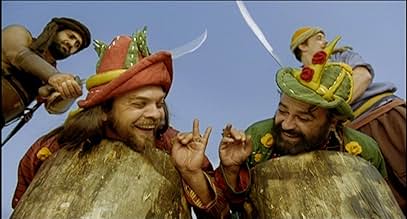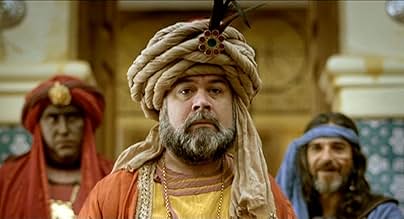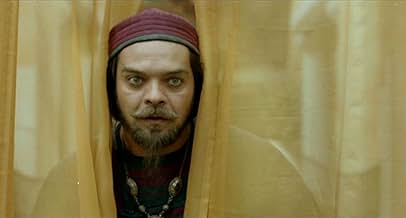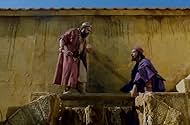IMDb-BEWERTUNG
7,5/10
13.921
IHRE BEWERTUNG
Eine Geschichte über die Tragödie und die Gefahr des Humors und den Humoristen - Eine Komödie so groß wie die Länder Roms.Eine Geschichte über die Tragödie und die Gefahr des Humors und den Humoristen - Eine Komödie so groß wie die Länder Roms.Eine Geschichte über die Tragödie und die Gefahr des Humors und den Humoristen - Eine Komödie so groß wie die Länder Roms.
- Auszeichnungen
- 9 Gewinne & 7 Nominierungen insgesamt
Aysen Gruda
- Ana
- (as Ayşen Guruda)
Empfohlene Bewertungen
It is not surprising to read bad reviews from international press since it's telling the not-well-known background story of a folkloric "shadow game" that we all know from childhood. Giving a difference perspective on the actual characters of hacivat and karagoz, it made me think of those times and what really might have happened to them. ALso a great look to the periods diversity and how Turks become Muslims one by one. This movie is one of the best Turkish movies I've ever watched lately, it's not referring to any cheesy jokes in reference to today's audience; it's not using it's actors' and actress' well known fame and it gives you the idea that Ezel Akay had just to shot a strong period movie with excellent costumes and art directing. Spoken language in the movie is something to be considered- it sounds foreign in the beginning but then you come to recognise the words and the old sayings that were used back then; a joint of middle-Asian Turkish, arabic, roman and hebrew. The scenes were delicately worked out, reminding of the famous ottoman art pieces.One thing that I didn't like much is the not-so-convincing visual effects, but well, don't see good cgi around here, so can't blame anyone.
10punery2
With its plot, actors, and artistic direction, there is no doubt that this movie is the best of Turkish cinema. The historical background is well studied, surveyed and depicted with a whimsical style. A true expression of the 13th Century Anatolia with its turmoil in the region is illustrated with fantastic humor and warm acting.
Although the movie does not claim to be a pure comedy, with its wit, satire, and critical humor, it is also one of the best Turkish comedies.
The most powerful part of the movie are the dialogs between the main characters "Hacivat" and "Karagoz" who are now the lead characters of Turkish traditional shadow play. Their lives unknown, they are remembered to be two contrasting characters, one of which coming from the educated class, and the other from the nomadic illiterate tribes.
Despite its historical setting, the story is still valid today considering the political setting in the world and freedom of speech.
Although the movie does not claim to be a pure comedy, with its wit, satire, and critical humor, it is also one of the best Turkish comedies.
The most powerful part of the movie are the dialogs between the main characters "Hacivat" and "Karagoz" who are now the lead characters of Turkish traditional shadow play. Their lives unknown, they are remembered to be two contrasting characters, one of which coming from the educated class, and the other from the nomadic illiterate tribes.
Despite its historical setting, the story is still valid today considering the political setting in the world and freedom of speech.
Firstly, the movie is not in comedy genre at all, and not pretending to be. Director continue his vivid style in costume, place, speech and casting in his second big hit. He offers more than expected and screening a tale that the world of 'Hacivat ve Karagöz' simulate an alive one referencing today with its own details.
Some traditions lasting till 'day is a heritage from old tribes lived before Ottoman Empire and Islam. These proved but not accepted truths has wounded a wide group of people in Turkey because of the position of Islam in Turkey; old shaman belief, former folks, lost traditions, secretly surviving believes and suppressed nations in Anatolia..
The movie points out bribe, position of women in society, naiveness of religious belief, statesman's tricks, cultural mixture, habits transferred by nations and humor as a criticism.
Lastly, this tale, a milestone for Turkish cinema with it's unique technique, is a political review with a historical base which stars two famous shadow players.
Some traditions lasting till 'day is a heritage from old tribes lived before Ottoman Empire and Islam. These proved but not accepted truths has wounded a wide group of people in Turkey because of the position of Islam in Turkey; old shaman belief, former folks, lost traditions, secretly surviving believes and suppressed nations in Anatolia..
The movie points out bribe, position of women in society, naiveness of religious belief, statesman's tricks, cultural mixture, habits transferred by nations and humor as a criticism.
Lastly, this tale, a milestone for Turkish cinema with it's unique technique, is a political review with a historical base which stars two famous shadow players.
"Karagoz Hacivat Neden Olduruldu" is Akay and Kazak's take of the legendary personalities Karagoz and Hacivat who are the main characters of Turkish shadow theater. Although their life stories are not known, Akay and Kazak tell a very plausible story that could easily be true. True or not, their story fits exactly what they symbolize - the synthesis of crude and sophisticated humor freely targeting dishonesty, corruption, unfairness and inequality in society.
The setting is the early 14th century, when Byzantian and Seljuk Empires were in shambles following the destructive Mongolian invasion. At the Muslim/Christian borderlands, and out of the reach of the now weakening Mongolian power, the Ottoman State is at its infancy, rapidly expanding at the expense of the neighboring Byzantian and Turkish principalities. Since the cultural homogenization is not as fast as military conquests, a colorful, eclectic intermixing of cultures is underway. This is the perfect breeding ground for the elements Akay seems to take his inspirations from, and he weaves them into his story so masterfully.
Ezel Akay seems to reach his maturity at a very early stage. With his second movie, he already has a signature style and an efficient formula to make the audience laugh and cry with only a snap of a finger. He has absolute emotional control over the audience, thanks to his masterful use of visuals and music.
He also owes a lot to Haluk Bilginer (Karagoz), who is an acting genius. (His talents seem to include Mongolian throat singing if my ears did not deceive me). Beyazit Öztürk (Hacivat) is not as talented an actor, but he is the wisest choice for the role. Another good casting is Güven Kirac as the villain. He has such a wide acting range, he gave me the impression that he could have played almost all the roles in the movie.
Like Akay's earlier movie 'Neredesin Firuze', the music is outstanding - Central Asian Turko-Mongolian tunes yet to be "contaminated" by Middle Eastern influences, beginning to clash with already eclectic Eastern Roman-Judaic melodies. The dynamic synthetic nature of the music parallels with the cultural synthesis what early Ottoman state and society building is all about.
The setting is the early 14th century, when Byzantian and Seljuk Empires were in shambles following the destructive Mongolian invasion. At the Muslim/Christian borderlands, and out of the reach of the now weakening Mongolian power, the Ottoman State is at its infancy, rapidly expanding at the expense of the neighboring Byzantian and Turkish principalities. Since the cultural homogenization is not as fast as military conquests, a colorful, eclectic intermixing of cultures is underway. This is the perfect breeding ground for the elements Akay seems to take his inspirations from, and he weaves them into his story so masterfully.
Ezel Akay seems to reach his maturity at a very early stage. With his second movie, he already has a signature style and an efficient formula to make the audience laugh and cry with only a snap of a finger. He has absolute emotional control over the audience, thanks to his masterful use of visuals and music.
He also owes a lot to Haluk Bilginer (Karagoz), who is an acting genius. (His talents seem to include Mongolian throat singing if my ears did not deceive me). Beyazit Öztürk (Hacivat) is not as talented an actor, but he is the wisest choice for the role. Another good casting is Güven Kirac as the villain. He has such a wide acting range, he gave me the impression that he could have played almost all the roles in the movie.
Like Akay's earlier movie 'Neredesin Firuze', the music is outstanding - Central Asian Turko-Mongolian tunes yet to be "contaminated" by Middle Eastern influences, beginning to clash with already eclectic Eastern Roman-Judaic melodies. The dynamic synthetic nature of the music parallels with the cultural synthesis what early Ottoman state and society building is all about.
Wusstest du schon
- WissenswertesKirakosyan used the fire as key light at night scenes.
- SoundtracksDört Kitabin Manasi
(The Meaning of Four Books)
Performed by Haluk Bilginer & Sebnem Dönmez
Music composed by Ender Akay
Top-Auswahl
Melde dich zum Bewerten an und greife auf die Watchlist für personalisierte Empfehlungen zu.
- How long is Killing the Shadows?Powered by Alexa
Details
- Erscheinungsdatum
- Herkunftsland
- Offizieller Standort
- Sprache
- Auch bekannt als
- Killing the Shadows
- Drehorte
- Produktionsfirma
- Weitere beteiligte Unternehmen bei IMDbPro anzeigen
Box Office
- Budget
- 3.500.000 $ (geschätzt)
- Weltweiter Bruttoertrag
- 3.004.541 $
- Laufzeit2 Stunden 15 Minuten
- Farbe
- Sound-Mix
- Seitenverhältnis
- 1.85 : 1
Zu dieser Seite beitragen
Bearbeitung vorschlagen oder fehlenden Inhalt hinzufügen

Oberste Lücke
By what name was Hinrichtung der Schatten (2006) officially released in Canada in English?
Antwort
